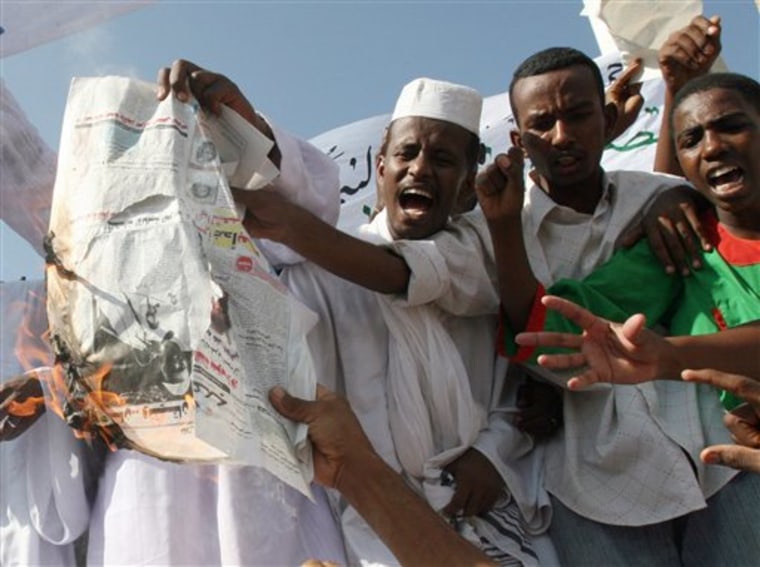Thousands of Sudanese, many armed with clubs and knives, protested Friday outside the presidential palace in Khartoum, demanding the execution of a British teacher convicted of insulting Islam for allowing her students to name a teddy bear "Muhammad."
In response to the demonstration, teacher Gillian Gibbons was moved from the women’s prison near Khartoum to a secret location for her safety, her lawyer said.
In Britain, Gibbons' son, John, told The Associated Press that her mother was "holding up well" and she made an appeal for tolerance.
"One of the things my mum said today was that 'I don't want any resentment towards Muslim people,"' John Gibbons said, relaying part of a telephone conversation with her
'Shame on the U.K.'
The protesters streamed out of mosques after Friday sermons, as pick-up trucks with loudspeakers blared messages against Gibbons, who was sentenced Thursday to 15 days in prison and deportation.
They massed in central Martyrs Square, outside the palace, for about an hour, while hundreds of riot police deployed nearby to keep control, though they did not attempt to disrupt the rally. "Shame, shame on the U.K.," protesters chanted.
They burned pictures of Gibbons and called for her execution, saying, "No tolerance: Execution," and "Kill her, kill her by firing squad."
Several hundred protesters, not openly carrying weapons, marched to Unity High School, where Gibbons worked, about 1.2 miles from the square. They stood chanting slogans outside the school, which is closed and under heavy security, then marched toward the nearby British Embassy. They were stopped by security forces two blocks away from the embassy.
The protest arose despite vows by Sudanese security officials the day before, during Gibbons' trial, that threatened demonstrations after Friday prayers would not take place. Some of the protesters carried green banners with the name of the Society for Support of the Prophet Muhammad, a previously unknown group.
Some of the protesters, carried clubs, knives and axes, but not automatic weapons, which some have carried at past government-condoned demonstrations, suggesting Friday's rally was not organized by the government. The protesters in the square dispersed in about an hour.
During Friday sermons, the Muslim cleric at Khartoum's main Martyrs Mosque denounced Gibbons, saying she intentionally insulted Islam but he did not call for protests.
"Imprisoning this lady does not satisfy the thirst of Muslims in Sudan. But we welcome imprisonment and expulsion," the cleric, Abdul-Jalil Nazeer al-Karouri, a well-known hard-liner, told worshippers.
'Arrogant woman'
"This is an arrogant woman who came to our country, cashing her salary in dollars, teaching our children hatred of our Prophet Muhammad," he said.
Hard-line clerics who hold considerable influence with Sudan's Islamic government, have sought to whip up public anger over the Gibbons' case, calling her actions part of a Western plot to damage Islam.
The conviction of Gibbons was seen as an attempt by the government to appease hard-liners, while trying to avert British anger by giving a relatively light sentence. Gibbons could have received up to 40 lashes, six months in prison and a fine if convicted on the heavier charge of inciting religious hatred.
Britain pursued diplomatic moves to free Gibbons. Prime Minister Gordon Brown spoke with a member of her family to convey his regret, his spokeswoman said.
"He set out his concern and the fact that we were doing all we could to secure her release," spokeswoman Emily Hands told reporters.
Class project leads to punishment
The case began with a classroom project on animals in September at the private school, which has 750 students from elementary to high school levels, most from wealthy Sudanese Muslim families.
Gibbons had one of her 7-year-old students bring in a teddy bear, then asked the class to name it and they chose the name Muhammad, a common name among Muslim men.
Each student then took the teddy bear home to write a diary entry about it, and the entries were compiled into a book with the bear's picture on the cover, titled "My Name is Muhammad," Boulos said.
But an office assistant at the school complained to the Ministry of Education that Gibbons had insulted the prophet by comparing him to an animal or toy.
U.K. Muslims condemn charge
Most Britons expressed shock at the verdict, alongside hope it would not raise tensions between Muslims and non-Muslims in Britain.
"One of the good things is the U.K. Muslims who've condemned the charge as completely out of proportion," said Paul Wishart, 37, a student in London.
Muhammad Abdul Bari, secretary-general of the Muslim Council of Britain, accused the Sudanese authorities of "gross overreaction."
"This case should have required only simple common sense to resolve. It is unfortunate that the Sudanese authorities were found wanting in this most basic of qualities," he said.
The Muslim Public Affairs Committee, a political advocacy group, said the prosecution was "abominable and defies common sense."
Archbishop of Canterbury Rowan Williams, spiritual leader of the world's 77 million Anglicans, said Gibbons' prosecution and conviction was "an absurdly disproportionate response to what is at worst a cultural faux pas."
Foreign Secretary David Miliband summoned the Sudanese ambassador late Thursday to express Britain's disappointment with the verdict. The Foreign Office said Britain would continue diplomatic efforts to achieve "a swift resolution" to the crisis.
Britain's response — applying diplomatic pressure while extolling ties with Sudan and affirming respect for Islam — had produced mixed results, British commentators concluded.
In an editorial, The Daily Telegraph said Miliband "has tiptoed around the case, avoiding a threat to cut aid and asserting that respect for Islam runs deep in Britain. Given that much of the government's financial support goes to the wretched refugees in Darfur and neighboring Chad, Mr. Miliband's caution is understandable."
Now, however, the newspaper said, Britain should recall its ambassador in Khartoum and impose sanctions on the Sudanese regime.
